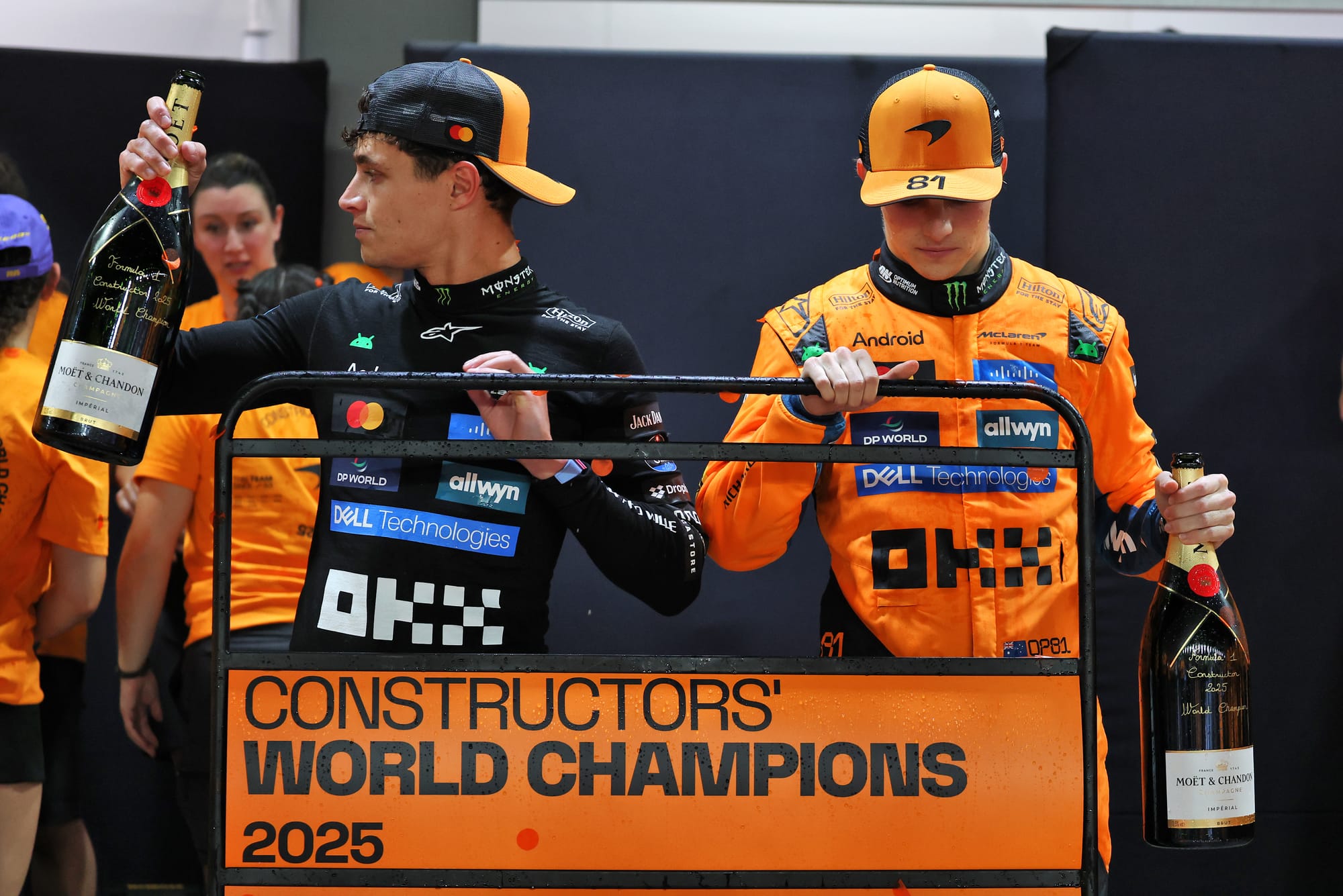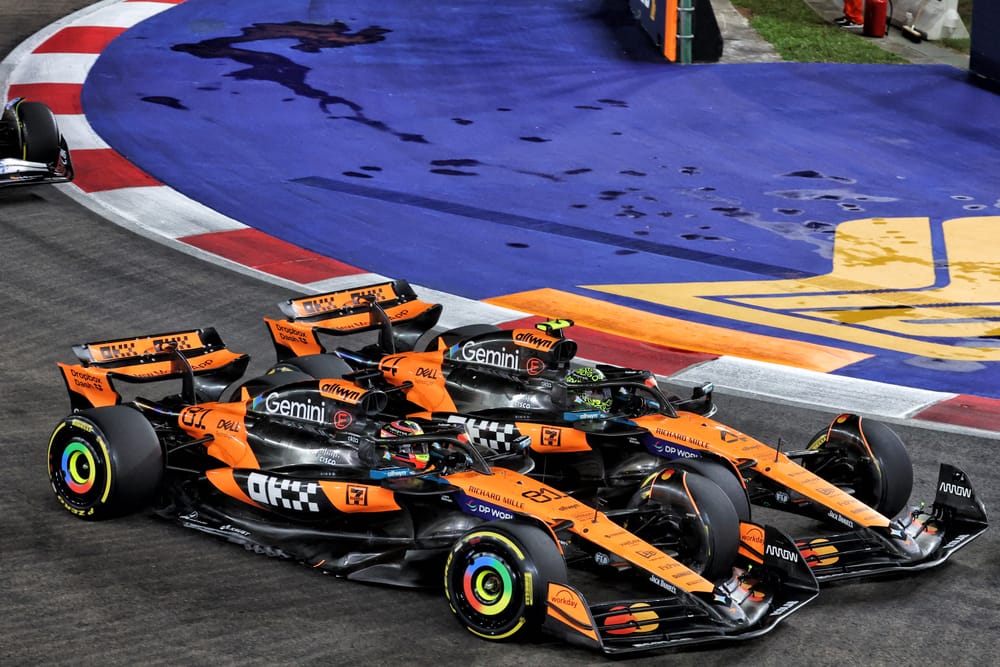Oscar Piastri's annoyance at McLaren's call to let Lando Norris get away with their first-lap, wheel-banging moment in the Singapore Grand Prix has ignited a debate about the fairness of their intra-team Formula 1 tight fight.
It is not hard to see why Piastri may feel that the clash in Singapore that appeared to breach the 'no contact' Papaya rules, off the back of a position swap at Monza after Norris's slow stop, suggests there is not total equality inside the team.
But the reality is that this is an extremely complicated situation, where things are not black and white. There are a number of grey areas here, especially because the definition of fairness itself can vary so much based on an individual's viewpoint.
What seems fair from one perspective, in righting a wrong, may be deemed incorrect from another if they feel that instead a right has been wronged. If circumstance is on your side, is it fair for that to be taken away to even things out?
At the heart of the issue too is a core principle that there is a world of difference between fairness of opportunity and fairness of outcome.
It is all too easy to fall into the trap that if the outcome is viewed to be unfair, then the opportunity was not also not equal. That is not always the case.
From McLaren's perspective, the robustness of its handling of Piastri and Norris's title fight can only really be judged on the fairness of the opportunity that both are given.
Its job is not to play God and control the outcome; its role is to ensure both its drivers have the same chance to get what is best for themselves.
So if we want to deliver a verdict on whether Piastri has been treated with total fairness this year, it is important to look at the opportunities offered to both drivers rather than the final outcome of races.
The hindsight mistake
Nothing highlights this more than the Belgian and Hungarian GPs. The races may have delivered different outcomes - Piastri won at Spa, Norris won at the Hungaroring - but they must be put in the same bracket when it comes to defining whether they were fair.
Both races featured the same narrative. The driver running behind on the road (in both cases Norris) was given strategic freedom to do something differently after the leader (Piastri) made his first stop.
In Belgium, it was on going onto an alternative tyre compound. In Hungary, it was switching to a one-stop strategy when it was known the Piastri was stopping twice.
At Spa, Norris's alternative strategy did not quite pay off as Piastri took the win; while a week later at the Hungaroring, Norris was able to capitalise and grab the victory.
If we are trying to judge fairness here, it is not about the result. It is of the opportunity.
So we cannot say that Belgium was fair and Hungary was not just because the lead car won one race but not the other. It was either fair at both races or unfair at both races that Norris was allowed to do something different.
Furthermore, judgement of this cannot come afterwards based on hindsight of knowing what the better strategy was, nor what the final result ended up being.
Instead, were the opportunities for both drivers equal? Were they both aware that this was the case? And were they applied equally across both cars?
The litmus test for this is ultimately if the positions were reversed, would events have played out the same way with the same chances given to the second car?
If the answer to that is 'yes', then the approach has to be judged as fair - even if the results from the two events are different.
The error factor
Fairness of opportunity also does not eliminate the possibility of mistakes being made that will have consequences in delivering unfair outcomes.
From Norris's perspective, the most obvious example was his engine failure in the Dutch GP. An outcome that could be deemed unfair, but there is no doubt McLaren is doing all it can to ensure that the opportunity of total reliability is equal across both cars.
The same can be said for some strategy calls too. At Imola, for example, Piastri was well up the road from Norris when he was committed early on to a two-stopper that was far from ideal.
The hope had been that the move would deliver an undercut advantage to help Piastri beat Max Verstappen. But when it became clear that the hard tyre was not quick enough, it set in sequence the offset that helped Norris beat Piastri to second place.
As team principal Andrea Stella reflected afterwards when asked if the Piastri call was wrong: "This is something that you can only judge in hindsight. If you deviate, that was the time to go for a two-stop.
"For the team, it's the same outcome, and for Oscar, it could have been the way to win. Sometimes when you take some risks to win, there may be a little bit of a downside."
This falls into the same category as Norris's Zandvoort engine failure.
Unfair outcome? Yes. Points lost because of it? Yes. But unfair opportunity? No.
Pitstops have been under the spotlight too, with a run of Norris problems since the summer break triggering a bit of recency bias in how things have not appeared equal across both cars (although Piastri had his own slow stop in Singapore).
But if we look at every stop this season and exclude the outliers, such as when penalties were served (Norris in Bahrain and Piastri at Silverstone), the difference is marginal.
An average of those stops for Norris is 3.02 seconds; Piastri's works out at 2.97 seconds. Such a small difference offers no evidence of bias in favouring one driver over the other.
Racing to the same rules

Where things have got clouded more recently, and what appears to have triggered Piastri, is that the fairness of opportunity that McLaren is striving for only works if both drivers are operating to the same playbook.
Monza became such a problem for Piastri because the rules of engagement as he understood them were that if slow pitstops affected the on-track battle between drivers that would not trigger any response to reverse positions afterwards.
So it is easy to see why, after Norris had his slow stop, that Piastri felt it was not right that team orders came into play.
McLaren's subsequent defence, as explained in the robust talks driver and team had post-event, was that the slow stop was an irrelevance in its decision.
Instead, it said the sequencing of events was triggered by wider strategic concerns involving the potential for a safety car and then, when that did not occur, Charles Leclerc coming up from behind - and this is why the positions were reversed once Norris emerged behind Piastri.
Singapore was a similar scenario of the rules that Piastri was playing too appearing not to be followed.
For him, the no-contact diktat is clear - so it seemed obvious that, after feeling that Norris had barged his way through, it would be viewed as an action that had crossed a line.
From McLaren's perspective, the contact itself was not deliberate, so it felt it did not need to intervene, unlike if the pair had crashed fighting for position alone.
Maintaining trust
McLaren's defences of Monza and Singapore do seem logical, but what matters now is whether deep down Piastri still trusts a system that appears to have betrayed him at least twice now in quick succession.
On Sunday night in Singapore, Piastri made a point to state that the team's "intentions are very well-meaning" even though there had been some difficult moments this year.
Beyond the outcomes of both Monza and Singapore appearing unfair, he needs to be clear in his head whether the opportunities were fair or not.
McLaren has made much of its approach to going racing only working if both drivers are on board and believe in it.
That why's events such as Canada, when Norris hit Piastri, and now Singapore, trigger long sit down conversations to analyse things, for grievances to be voiced, and to lay down an agreed framework to move forward.
Its duty now is to be sure that Piastri retains belief in the system. Otherwise all the push for fairness of opportunity goes out the window - and that is an outcome that is not good for anybody.



